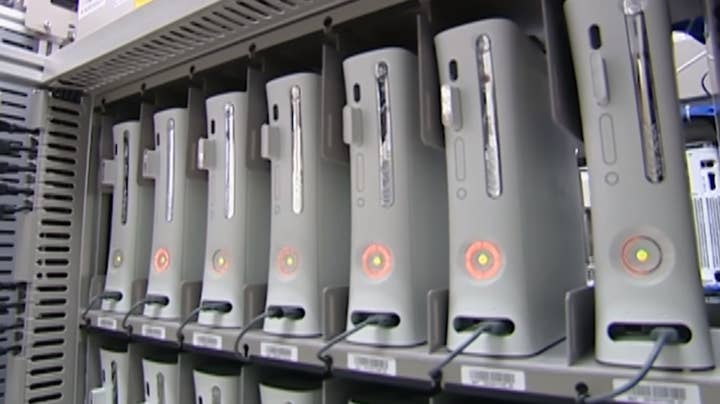Right to repair | This Week in Business
Problems of ethical sourcing for minerals are aggravated by business decisions and consumption patterns that produce mountains of e-waste
This Week in Business is our weekly recap column, a collection of stats and quotes from recent stories presented with a dash of opinion (sometimes more than a dash) and intended to shed light on various trends. Check back every Friday for a new entry.
This week we published our ninth annual conflict minerals report on the industry's efforts to source the materials it needs without fueling armed conflict and human rights abuses.
It's a bummer of an article even in the years where the industry posts significant progress on that front, and dear reader, this was not one of those years.
Microsoft and GameStop showed deeply concerning backsliding on their supply chains for conflict minerals (gold, tin, tungsten, and tantalum), and only one of the ten companies we looked at – Logitech – showed any improvement year-over-year.
And that's just the results for the part of the supply chain they're legally required to tell us about. These reports generally don't cover companies' supply chains for other minerals often found in electronics like zinc (which has been tied to slave labor), iron (armed conflict), mica (slave labor), and cobalt (slave labor).
But as I put together this year's report, I kept coming back to a line from last year's report.
QUOTE | "I think at some point we need to just recognize that we use too much minerals, and maybe the main focus should be on recycling and decreasing the amount of minerals we use." - Raphael Deberdt of the Responsible Sourcing Network, a charitable organization dedicated to ending human rights abuses associated with raw material supply chains.
For years, we've held up Apple and Google as some of the best in the industry for ethical sourcing of conflict minerals because of their vigilance over their supply chains and reliance on smelters and refiners that have passed third-party conflict-free audits.
But I'm not sure they should be applauded for ethically sourcing minerals when their design decisions lead to those painstakingly extracted minerals being tossed into a landfill in the not-too-distant future.
STAT | 3,851 – The number of Oakland Unified School District Chromebooks that were rendered useless in the past year because Google stopped providing software updates for them, blocking basic apps and websites in the process, according to a San Jose Mercury News report.
Oakland Unified estimates it will have 40,000 more of these expired Chromebooks on its hands over the next five years, and that's just a single school district in a single state. About 50% of surveyed school district leaders across the US said they used Chromebooks across all their schools.
STAT | 18 months – The length of time some people had their original Apple AirPod wireless earbuds before the non-replaceable battery failed and rendered them useless, as reported by Vice Motherboard.
A few new models later, Apple still doesn't repair AirPods, instead sending them to "a best-in-class recycler" and giving users new AirPods instead.

While it's great to ensure we're taking these minerals out of the ground the right way, it's less great if the products we make with them are virtually disposable, requiring constant replacement because of deliberate design decisions.
"We have an overconsumption problem as a species"
To get a better-informed perspective on why today's new tech becomes tomorrow's e-waste, we spoke with iFixit director of sustainability Elizabeth Chamberlain this week. For the past 20 years, iFixit has been providing people with free repair guides and teardowns of the latest tech, all while advocating for right-to-repair legislation.
Chamberlain says the site's goal is to keep the things we have working for as long as possible.
"We have an overconsumption problem as a species," Chamberlain says. "At iFixit, we're techno-evangelists. We believe that technology makes the world a better place, but it also makes the world a worse place as we pull things out of the ground in ways that are damaging to people and damaging to the environment. One of the best ways we can reduce that impact is by repairing the things we've already got and eking as much life out of them as we can."
Chamberlain points to a number of things the gaming industry does right on this front, like the modular design approach of PC gaming where individual components of the hardware have always been relatively easy for owners to replace.
Things on the console and handheld side are not typically as modular or repair-friendly, but there are some encouraging signs on that front. She notes that Valve's Steamdeck is more modular than the typical handheld and allows for user upgrades and repairs in a way that others don't.
But there's still plenty of room for improvement, she says, particularly in the practice of parts pairing.
For example, the disc drive in any Xbox Series X or standard edition PS5 is "paired" to the specific motherboard it shipped with. So if the disc drive breaks, the user needs to replace both the broken disc drive and the perfectly functional motherboard at the same time with a different paired set of parts.
"That turns what should be a $20 or $30 repair into a $200-plus repair, which makes it not really feasible for a lot of people," Chamberlain says.
That's a deliberate design decision Microsoft first implemented with the Xbox One generation, not to inflate repair bills but to fix a security weakness that led to piracy early on in the Xbox 360's lifespan, as Microsoft software engineer Tony Chen explained at the 2019 Platform Security Summit.
There's often a reason for the wasteful practice beyond simple greed, because who doesn't love plausible deniability?
So there's often a reason for the wasteful practice beyond simple greed, because who doesn't love plausible deniability? AirPods can't have user-replaceable batteries because that might require a less appealing form factor, you might be told. People using Chromebooks after they are no longer receiving security updates are putting what could be vital personal information at risk, and it's unreasonable to expect companies to provide support from here to eternity.
Even when Apple released updates deliberately slowing down older models of iPhones, the company said it was not an attempt to make customers think they had to buy new phones so much as a necessary measure to prolong the phones' battery life.
So when instances like these crop up, how are we supposed to know when a company is taking practical steps around technological limitations and when it's pursuing a strategy of planned obsolescence to make money?
"It's so hard," Chamberlain says. "It's maybe even impossible, in that no company is going to admit to a strategy of planned obsolescence at this point. One, because it's wildly unpopular. And two, because it's actually illegal in France, so nobody is going to say they have a strategy of planned obsolescence."
STAT | €25 million – How much France fined Apple for that older phone slowdown move. In May, France confirmed it is again investigating Apple under its planned obsolescence law, with parts pairing and right-of-repair-thwarting tactics at issue.
As for some of the other excuses we've heard, Chamberlain notes that Samsung's Galaxy ear buds have a similar form factor to Apple's AirPods and a user-replaceable battery (though as the iFixit guide details, it's a moderately difficult procedure).
And on Chromebooks, Chamberlain suggests manufacturers set the expiration date on security updates for devices based on the last day that product is sold rather than on the first day it's manufactured.
"If they provided seven years of updates after the last sale date, nobody would buy a machine and then two weeks later discover it stopped receiving updates," Chamberlain says. "That happens now, which is bizarre and surprising to people who aren't expecting that when they buy a Chromebook at Best Buy."
Will companies fix it?
While it might be tempting to assume the worst motivations possible from some of these companies, Chamberlain says she's been surprised at how much support she's seen for sustainability initiatives in iFixit's meetings with engineers and executives.
"There are a lot of engineers who do want to do the right thing and don't want to be creating disposable trash... But they're facing a lot of design constraints, a lot of market constraints"Elizabeth Chamberlain
"It's opened our eyes to good will within those organizations," she says. "I think there are a lot of engineers who do want to do the right thing and don't want to be creating disposable trash or responsible for pulling out more conflict minerals than they absolutely have to. But they're facing a lot of design constraints, a lot of market constraints, and I think really the challenge for them is to continue listening to voices like the GamesIndustry conflict minerals report, and to keep those concerns at the forefront in the design process."
Chamberlain doesn't mention any receptive people or companies specifically, but we'll point to Microsoft here. This year's conflict minerals report was headlined by the company's failures, and its parts pairing practices are certainly problematic.
But Microsoft has also voiced support for the right to repair, a position it took in 2021 in response to a shareholder resolution from advocacy non-profit As You Sow.
It promised at the time to expand device repair options, and has since done so, first with its Surface laptops and now with Xbox controllers.
Last week, Microsoft added an Xbox repair and replacement parts page to the Microsoft Store with controller shells, buttons, and circuit boards, as well as releasing a repair guide for gamepads and videos detailing the process on the Xbox Support YouTube page.

The availability of the parts isn't new – iFixit has been selling them for some time – but Microsoft building awareness that this is an option and helping people learn how to do it is new. And that's a tangible improvement, the result of individuals within the company pushing for something better and the company at least allowing it to happen.
"Whether or not anyone at Google sees the auto-update expiration date as planned obsolescence, that is its consequence"Elizabeth Chamberlain
"Is there deliberate planned obsolescence happening at some level? Probably," Chamberlain says. "But I think the vast majority of people working for manufacturers are not trying to create trash. I don't know if there is a way to tell the difference from the other side of the door, but we can look at the consequence that is planned obsolescence without needing to positively identify it as a business strategy. Whether or not anyone at Google sees the auto-update expiration date as planned obsolescence, that is its consequence."
That gap between the intentions of individuals and the effects of their collective actions is a huge part of the problem. Individuals may see the need for action and more sustainable practices. And obviously some companies are going to be better on the subject than others. But collectively, it's simply not a priority for the industry.
We know this because for all the sustainability pledges and commitments to be carbon neutral several decades down the road, when the big players get together as a trade group and figure out the policy positions they want to work toward, sustainability just doesn't make the cut.
In fact, the Entertainment Software Association website lists a dozen policy positions on key subjects, and the only sustainability issue on there is one the ESA is actively fighting.
QUOTE | "So-called 'right to repair' legislation, which could require manufacturers of consumer electronics – including video game console makers – to turn over sensitive tools, parts and know-how to unauthorized repair facilities. These types of mandates could significantly compromise the security of video game consoles and the security of the video game ecosystems they rely on. In addition, allowing unauthorized parties to bypass the console's technical protections – which may be necessary for certain hardware repairs – would allow any number of illegally-copied games to be played." – The Entertainment Software Association's official stance on right to repair legislation.
Obviously a trade group is not going to spend its limited political capital pushing for legal restrictions on its membership, but that's also why we obviously cannot trust the industry to fix any issue if it requires such restrictions. Even though for-profit companies might not set out to fund human rights abuses or clutter the world with e-waste, they never want to rule it out as an option in case that's the most financially prudent course of action.
This is not a problem we can trust companies to solve.
Will consumers fix it?
So what about consumers? Surely we could solve the problem by simply not buying products designed for disposability. If you buy into economic philosopher Adam Smith's invisible hand of the market, then hardware that dies after a few years and rots away in a junkyard (or not, considering the non-biodegradability of all this stuff) would come back on a company and stop people from buying their products in the future.
But as it turns out, it doesn't really work like that. And for evidence of that, we can turn to the testimony of an economic philosopher with a better understanding of the modern games industry.
QUOTE | "It was frustrating but they had hooked us. So when you hook somebody, you know they're not gonna leave." – In Microsoft's own documentary on the Xbox 360's Red Ring of Death hardware failures, Snoop Dogg explains why the invisible hand of the market didn't cause people to jump ship to competing consoles.

Microsoft publicly acknowledged its massive Red Ring of Death problem less than two years into the console's lifespan. It would go another six very successful years before the launch of its successor, doubling the lifespan of the original Xbox.
I had two Xbox 360s die on me. I knew other people who had gone through five or more systems. You would think that would have made us wary of continuing to give Microsoft our money, but we weren't ready to walk away from our libraries of game discs and downloaded titles purchased for Microsoft's ecosystem. We had friend lists stocked with people we wanted to keep playing with, and they weren't all going to coordinate a jump to a rival platform.
The switching costs were too high, so we stuck with the Xbox 360, investing further into the system and increasing that lock-in effect.
But even if we collectively did burn our bridges over a failure like the Red Ring of Death and swear off a major brand for good, tech customers can generate plenty of e-waste even when the products work fine because we are nothing if not conditioned to consume.
We are forever enamored with flashy new technology and clever design. It's more speed, more power, bigger storage and screens, smaller and sleeker form factors. From Nintendo's penchant for iterative handheld hardware to Microsoft and Sony's pro controllers and mid-generation upgrades, gamers have plenty of excuses to stop using old hardware after just a few years.
Even software – the one thing about this hobby that doesn't actually need a physical component at all – is frequently available as a $300 collector's edition with extra landfill padding, even when the game itself is still just downloaded.
Companies have every reason to want us all to buy new products as often as possible, and it is difficult to tell what consumers will ultimately accept (Red Ring of Death hardware failures) versus what they won't (Xbox One's planned digital restrictions).
This is not a problem we can trust consumers to solve.
That's not to say we don't have a role to play here. Because consumers expressing themselves can absolutely help, albeit indirectly. We can push back against wasteful tech and wasteful policies, pressure companies to adopt better practices. Some companies will listen. Some individuals within companies will try to do their part.
And of course, we can take issues like sustainability into account when we decide who to vote for, which brings us to another avenue to address the problem.
Who's left to fix the problem?
Chamberlain points to the results of this year's conflict minerals report, and the idea that the industry did meaningfully improve on the sourcing of conflict minerals, but has slipped as the subject has become less "trendy" in recent years.
"That's the danger of relying on 'vote with your wallet,' relying on public opinion, relying on reporters to push companies to do the right thing," she says. "There's only so much attention any individual or reporter can pay to these things, and if companies aren't pressured, they're not going to be inspired to make changes."
In short, a big part of the sustainable tech solution will need to come from government action.
Fortunately, Chamberlain says there's been clearly increasing traction on this front in recent years between the EU's circular economy initiatives, the Horizon 2020 program, and pending legislation aimed at cutting down e-waste, like requirements for tech to have user-replaceable batteries and standardized USB-C charging ports.
It's always a bit unnerving when politicians pay too much attention to the tech sector, considering their understanding of the industry might top out around "the internet is a series of tubes." But we will need them involved if we're going to address these sourcing and waste problems, because there are too many companies in too many places with too few humanities courses taken by the C-suite's MBAs to wait for everyone to come around one by one.
Much like construction and food sanitation standards, sustainable practices are functionally invisibly to the end consumer. Corners can be cut in these areas and the customer may never know the difference until they run smack into the very good reasons laws around these things exist in the first place. It's bad enough when the end result is a housefire or food poisoning, but it seems objectively worse when the negative outcome is a ravaged planet with depleted resources and a hostile climate, along with all the horrific secondary effects those calamities bring.
"I think the role of legislation is to make changes that last, to make changes that go beyond those brief moments of public attention on something," Chameberlain says.
"And that's why we're pushing so hard for right to repair legislation. We're in a moment where public opinion has started to turn and attention has started to turn at a broader scale for right to repair."
A moment like that can't be taken for granted. Let's not waste it.
The rest of the week in review
The main write-up went a bit long this week so let's keep this short and (mostly) relevant.
QUOTE | "Some third-party publishers are said to have expressed concern that legacy support for Switch games could negatively affect sales of next-gen titles." – VGC's sources for its story on Nintendo's next-gen console plans say some companies are advocating for Nintendo to leave backward compatibility out of the Switch successor because they would prefer people constantly consume new things instead of get the most use out of the things they already have.
QUOTE | "For hardware, by continuing to convey the appeal of Nintendo Switch, we try not only to put one system in every home, but several in every home, or even one for every person." – Nintendo's first quarter earnings report helpfully underscores how game companies are not going to be terribly supportive of efforts to have people consume less.
QUOTE | "The best answer I can give is the honest truth: I'm exhausted." – In announcing that Feminist Frequency will shut down after 15 years, Anita Sarkeesian's gives a pretty good example of why we can't rely on individual action to solve systemic problems. Individuals can make a difference and should be commended for their work, but those who try to hold more than their share will tire and break long before the system does. Best wishes to Sarkeesian in everything she does next.
STAT | 32 – The number of employees laid off by The Callisto Protocol developer Striking Distance Studios this week.
It seems like a particularly cruddy thing to do considering this is a studio so hung up on loyalty that it cut people from the credits of the game because they left mid-development, yet now it's kicking out the loyal ones who stuck around. I'm sure management wasn't thrilled about doing it, but as we mentioned above, for-profit companies have a tendency to drop their stated values whenever it's financially prudent.
(Months after we reported on the credits omissions, Striking Distance quietly added more than 50 names into the game's credits roll.)
QUOTE | "Promotion or sponsorship of skins gambling is prohibited under our policy." - Twitch this week added a prohibition on streamers being sponsored by skins gambling sites, because promoting gambling to kids is bad. It still allows for streaming sports betting and poker, but not slots, roulette, or dice games, because only certain types of gambling are bad for kids, I guess?

